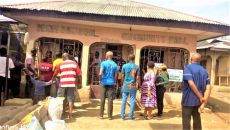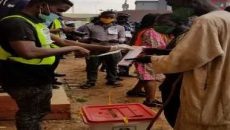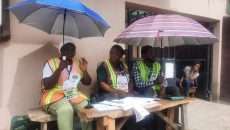Protests spontaneously broke out in Abuja and Port Harcourt on Monday, February 27, as the Independent National Electoral Commission, INEC, battled with the problems of non-use of the Bimodal Voter Accreditation System, BVAS machines across the country.
Youths besieged the INEC headquarters at Zambezi Crescent, Abuja, chanting, ‘We no go gree! We no go gree!” At Port Harcourt, women protested with green leaves against what they felt was manipulation of results to produce results unrepresentative of their votes.
There were discrepancies between some results uploaded in INEC results portal and the results announced by the states’ collation officers. In an instance in Ekiti State, the data uploaded as result was a picture unconnected with the election; not the result from the polling unit. Many irregularities, violence, underage voting, and suppression of votes were reported across the country.
According to the Electoral Act, results from polling units would be recorded in the BVAS machine and transmitted to the INEC result portal as primary data, while the results sheets will be taken to the collation centre. This will enable parties and the public to follow the results from the polling unit to the final stage at the National Collation Centre. To the disappointment of Nigerians, INEC ignored this provision and resorted to manual collation only. This does not assure transparency, nor justify the billions spent on the BVAS technology.
At the National Collation Centre at the International Conference Centre, Abuja, agents of the Peoples Democratic Party, PDP, Dino Melaye; his Labour Party, LP, counterpart, Umar Farouk Ibrahim, Action Peoples Party, APP, Chinemelo Ubah, and the African Democratic Congress, ADC, staged a walk-out, alleging a flawed electoral process. They had proposed suspension of collation of results to allow INEC to upload the polling units results on its server but INEC Chairman over-ruled them. He prefers to review the results later, if necessary.
Melaye and other party agents had asked for the cancellation of Ekiti result, with observed over voting. They further asked INEC to show transmitted results state-by-state on the screen for all to see in line with the Electoral Act so political parties could access them on the Commission’s portal.
The INEC Chairman insisted there was no over-voting in Ekiti. He explained that “Towards the end of the spreadsheet, we provided three columns. The first column is total valid votes and that is 308,171; Total rejected votes, 6,301; Total votes cast, 314,472, which is actually lower than 315,000, 058. Let me recap. Total number of accredited voters 315, 058. Total votes cast – both valid and invalid, 314,472. There is no over voting.
“I repeat myself once again for clarity. If there is any figure different from what I have presented, and what came from the manual forms completed by the state collation officer for the presidential election, please discountenance that figure. It did not emanate from the Commission.
“I saw some postings on social media to the effect that the election result was published on the 20th of February, five days ahead of the election. They took the results presented yesterday (Sunday) and took the total number of registered voters for Ekiti, and concluded that the results were prepared several days before the election.
“All Nigerians will bear witness that it is in this hall we presented the hard copies of the total number of registered voters in Nigeria on state by state basis, and then the number of PVCs collected. And that information, as we speak, is on the Commission’s website.
“So if anybody is trying to be clever by half by taking figures from somewhere and saying all these results were published, or released ahead of the election, that one can only pass for fake news. And I’m sure that we are responsible citizens not to fall for fake news.
“So, my first response is that for the election results presented, for equity, there was no over-voting. Over-voting means the total number of votes cast is higher than the number of accredited voters. The number of accredited voters is in this particular case higher than the total number of votes cast.”
Yakubu was satisfied that the figures on the spreadsheet emanated from the polling units. “We have provided the votes scored by each political party. However, if any political party believes that the figures they have from the hard copies of the results given by their polling agents at the level of collation, that if figures are inconsistent with what has been provided on the spreadsheet that we projected yesterday, that political party should forward the information to the Commission so that we can speak on the basis of facts”.
On his power to review results within seven days, he said the collation has to be completed. “And to assure political parties that any evidence that you have of any alleged wrongdoing, at any level of the process, whether it is at the polling unit or collation level, please forward this information and I promise you as soon as the process is concluded, we will then do the review, as provided by law. On this note, I beg you, for us to proceed with the process.”
Melaye and other protesting agents disagreed with Yakubu: “We party agents, having observed that the national chairman of INEC is determined to rig the election by making sure that results are not uploaded by vehemently making a presentation that makes us look as if we are all here to rubber-stamp the fraud. We are saying that we are not here to rubber-stamp the electoral fraud that has been prepared by INEC and APC.
“He is now saying we should wait for the process to be completed; that there will be a review knowing full well that after the announcement, there can’t be any review. So, we are completely dissociating ourselves and that’s why we staged a walkout to express the unfortunate politicisation and commercialisation of our electoral process.
“We are saying INEC is compromised. APC has influenced INEC and we can see results are being changed. We have records of where elections did not take place and results are being prepared. We have records of where the BVAS were not used and results have been pronounced. What is difficult in the chairman to display the uploaded results so that we can compare it with that which is made by the state returning officers?
“They cannot upload results. They cannot show us the uploaded results because they know that what they are going to upload will be at variance with what will be presented to Nigerians. The electoral process has been rigged and we are disassociating ourselves from it. Our resolution is that the entire process be canceled. We are saying that the system has been compromised. INEC is compromised; we are saying the entire process be canceled.”
Similarly, the national secretary of Labour Party, Umar Farooq Ibrahim, alleged the party has reliable evidence that BVAS machines were not used, and in places where they were used, they were compromised.
“We have aired our observations to the National Chairman of INEC and he has refused to listen to us. When we make observations, he wants us to accept the results that came from the collation centre at various states. We do not agree with that. And we have empirical evidence that we have our agents who have observed, and they have informed us reliably that the BVAS machines have not been used, where they were used, and where they were compromised.
“And the results of the BVAS machine have not been uploaded to the server and we have observed on Saturday around the hour of 2pm. The portal has gone down…and he wants us to accept what they are presenting here, and so on. The issue is the system truthfully being used.”
Labour Party, in a press conference in Abuja Monday, expressed disappointment with the conduct of the election. Akin Osuntokun, the director general of its Presidential Campaign Council, Abuja,
“The President promised Nigerians free and fair elections with the passage of the new Electoral Act, and indeed has repeated this promise multiple times. The INEC Chairman also came before Nigerians and the global community to promise free and fair elections and severally reiterated its readiness to conduct the elections. What has become glaring is that none of these promises has been kept. All the promises made about deploying a fail-safe system anchored on BVAS were broken.”
The party therefore called on INEC “to suspend further announcement of the results, and follow its own guidelines, or completely cancel the entire election and make plans for another election with strict compliance with the stipulated laws and guidelines.”
However agents of other political parties dissociated themselves from the walkout and affirmed they were still present. Eighteen political parties are participating in the 2023 general elections.
The APC agent, Babatunde Ogala said the party had confidence in the process, and “we are not part of walkout or boycott as some have done.”
The international observers also expressed dissatisfaction over the conduct of the election and collation of results. The IRI and NDI, in their preliminary statement by their leader and former President of Malawi, Dr. Joyce Banda, said the election fell well short of Nigerian citizens’ reasonable expectations. The Nigeria 2023 International Election Observation Mission urged the international community to sanction perpetrators of electoral violence in the ongoing general election in Nigeria.
“The delegation observed that late opening of polling locations and logistical failures created tension,s and the secrecy of the ballot was compromised in some polling units due to overcrowding. At the close of the polls, challenges with the electronic transfer of results and their upload to a public portal in a timely manner undermined citizen confidence at a crucial moment of the process. Moreover, inadequate communication and lack of transparency by INEC about their cause and extent created confusion and eroded voters’ trust in the process,” said Banda.
“The combined effect of these problems disenfranchised Nigerian voters in many areas, although the scope and scale is currently unknown. Despite these issues, Nigerians once again demonstrated their commitment to the democratic process. Voters displayed extraordinary resilience and resolve to have their voices heard through the ballot, and INEC administered a nationwide election according to the electoral calendar for the first time in the country’s recent history.
“As the nation awaits the results of the February 25 polls, and the Nigerian people prepare for upcoming gubernatorial elections, we urge political actors and their supporters to remain calm and exercise restraint. The mission encourages INEC, the government, political actors, and civil society to redouble their efforts to deliver on citizen expectations for transparent and inclusive elections, and to ensure that electoral outcomes are a credible expression of the voters’ will.”
However, Commonwealth Observers Group assessed the election as, “largely peaceful.” Chairman of the Group, Thabo Mbeki, a former President of South Africa, in the team’s preliminary assessment said Nigerians were largely accorded the right to vote.
“We congratulate all Nigerians for their determination, patience and resilience displayed throughout the electoral process. We call on all those with grievances to address disputes through prescribed legal channels,” Mbeki said.
The European Union observed: “Nigerians went to the polls in highly anticipated presidential and National Assembly elections; that INEC kept on schedule despite a volatile and challenging environment. Fundamental freedoms of assembly and movement were largely respected, yet the full enjoyment of the latter was impeded by insufficient planning, insecurity and the prevailing Naira and fuel shortages.
“Abuse of incumbency by various political office holders distorted the playing field and there were widespread allegations of vote buying. Media provided an extensive coverage of the three leading campaigns, while disinformation interfered with voters’ right to make an informed choice on Election Day. The EU Election Observer Mission, is continuing its observation of the ongoing collation and tabulation of results throughout the country.
“INEC’s operational capacity was hampered by the ongoing fuel and Naira shortage. Insecurity prevented it from accessing some local government areas, notably in the South. Attacks on INEC premises, including just days before polling, hindered preparations in affected areas, while instilling fear in voters.
“Overall, stakeholders had expressed confidence in INEC’s independence, professionalism, and voter information efforts, but this decreased ahead of elections. INEC lacked efficient planning and transparency during critical stages of the electoral process, while on Election Day trust in INEC was seen to further reduce due to delayed polling processes and information gaps related to much anticipated access to results on its Results Viewing Portal (IReV).”
Meanwhile, the Inspector-General of Police, Usman Baba, has admonished political parties to control their supporters. A statement by Olumuyiwa Adejobi, chief superintendent of Police, CSP, and public relations officer, said the warning was “consequent upon a series of intelligence reports, and high expectations from all angles.
“The Nigeria Police Force has deemed it necessary to charge presidential candidates of all political parties, most especially APC, PDP, LP and NNPP, to caution their party stalwarts and supporters to avoid making inciting comments capable of unnecessarily heating up the polity and creating undue excitement amongst the electorate and the general populace in the country.
“The NPF, having assessed the trend of scaled-up expectations and psychological projections on the ongoing electoral process, viz-a-viz collation of results, charges all presidential candidates, as leading and respected figures in their respective political parties, to seize the opportunity of this waiting period to emphasise the rule of law, respect for the constitution, and constituted authority amongst their supporters, as we all owe a duty to ensure that the nation does not fall into anarchy on the basis of interests and sentiments. “The police, therefore, encourage presidential candidates to admonish their supporters to uphold the tenets of the peace accord recently signed for the smooth conduct of the 2023 general elections.”
Follow Us on Social Media



 WhatsApp us
WhatsApp us